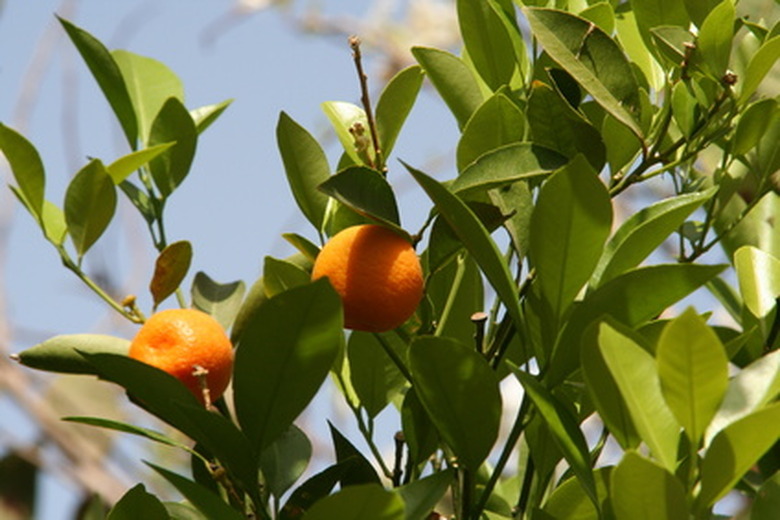What Is A Pesticide & Fungicide Spray For Citrus Trees?
Citrus trees are one of the easiest fruit trees to grow, but may require insecticides and fungicides for optimum health and fruit production. Choose sprays for your citrus tree based on their active ingredients rather than by brand. Each comes with its own benefits and disadvantages. The size and health of your tree should also be a factor in your selection of a insecticide and/or fungicide.
Why Citrus Trees Need Fungicide
Citrus trees become infected with different types of fungus spores. They manifest into diseases like Greasy Spot and Citrus Scab. If left untreated, citrus trees with fungus lose their leaves and produce less fruit. Fruit that sets is often disfigured and inedible. Trees that are stressed by fungus are also more prone to cold damage and insect infestations.
- Citrus trees are one of the easiest fruit trees to grow, but may require insecticides and fungicides for optimum health and fruit production.
- Choose sprays for your citrus tree based on their active ingredients rather than by brand.
Copper Fungicide
Copper fungicide is used as a preventative spray for citrus ailments like Alternaria Brown Spot and Citrus Scab. You can use it up until the day fruit is harvested. It is also cost-effective, because it can be used on other types of trees, shrubs, vegetables and grass.
Copper fungicide is a combination of a fatty acid and soluble copper. It works on a large number of plant diseases, but users should pay close attention to mixing procedures specific to citrus trees. Copper fungicide is sold in ready-to-use sprays or in liquid concentrates. As with all pesticides, follow safety precautions on the label.
- Copper fungicide is used as a preventative spray for citrus ailments like Alternaria Brown Spot and Citrus Scab.
- It works on a large number of plant diseases, but users should pay close attention to mixing procedures specific to citrus trees.
A draw back of copper fungicide, and other contact types, is that it requires more than one application. Treating fungus with copper fungicide must be well timed. A preventative treatment for citrus scab, for example, takes three applications. The first treatment should come in spring when new leaves are no more than 1/2 inch unfurled. The second spray should take place after the blossoms fall, and the third application should be done three weeks later.
Criteria for Evaluating Insecticides and Miticides for Citrus Trees
Only certain insecticides and miticides are registered for use on edible crops like citrus. Oils and soaps target soft-bodied insects like aphids, but will work on other pests including white fly and spider mites. Biologically derived sprays like Bacillus thuringiensis, commonly labeled as BT, target chewing pests like caterpillars.
- A draw back of copper fungicide, and other contact types, is that it requires more than one application.
Chemical pesticides remain active and take longer to break down than oil and biological treatments for citrus trees. Information is available about specific active ingredients in reference books, product labels and on fact sheets from The National Pesticide Information Center (managed by Oregon State University and the US Environmental Protection Agency).
Chemical pesticides kill a broad spectrum of insects compared to other types of sprays. For this reason they pose a higher threat to beneficial insect pollinators, which are crucial to citrus production.
Multipurpose Neem Oil
Neem oil is plant-derived and acts as an insecticide and miticide, while also serving as a contact fungicide. It can be used as a preventative or treatment spray for citrus trees. It is only dangerous to pollinators wet with the spray. Spray in early morning or evening to avoid this.
- Chemical pesticides remain active and take longer to break down than oil and biological treatments for citrus trees.
Considerations
Use mild treatments, like insecticidal soap and oil, on small unhealthy trees before resorting to chemicals. Chemical pesticides can stress already weak citrus trees, but can be used when severe insect and disease issues persist.
